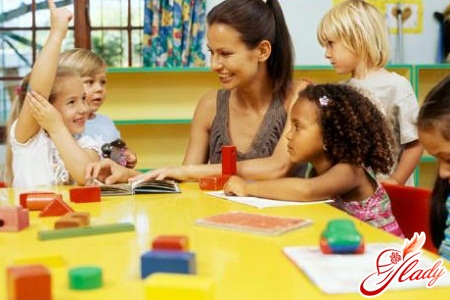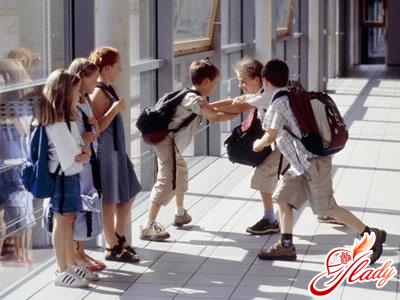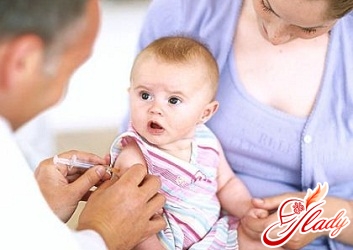 The question of which school to give the child to, earlyor late rise in front of each parent. Has your little one grown up and is about to go to school? Of course, all parents dream and do everything possible to ensure that their child was trained in the best school. However, few parents can clearly answer such a simple question as what is a good school in their understanding. This will be discussed in this article. Some parents believe that a good school is a school of old Soviet "hardening", similar to the one in which they once learned themselves. For other parents, the sample of a good school will be a prestigious, expensive school, in which children of parents belonging to the so-called "higher society" learn. Such a school should be on the first lines of any ratings, in the building of the school there must be extremely expensive repairs, the most modern teaching aids, equipping classrooms. For the third parents, a good school is associated with protection, a swimming pool, several foreign languages, classes with a small number of children, an individual approach to each of the pupils, however, at the same time, with iron discipline. All teachers teaching in such a school should be the best and highly qualified. Based on simple logical considerations, some ideas about a good school almost completely exclude others. And what is ideal for one child will be completely unacceptable for another. So, for example, if your kid is shy enough and quiet, for him the school with a cozy home atmosphere will suit just perfectly. And if, on the contrary, he needs a strict discipline, such a school will relax the child, which will lead to a decrease in academic performance or even a loss of interest in the learning process. So, how do parents make a choice and find a really good school for their future first-grader? After all, the choice of a school for a child is perhaps the most important choice. Of course, for this you will have to make a lot of efforts. However, do not neglect this process, because in your chosen school your child has to study for a long eleven years. And it is the school that largely determines the future of the child and what kind of person he will become. After all, despite all the efforts of the family, the school environment in many ways determines the formation of the character of the child, his worldview and life values. School friends will also have a significant impact on your child and will play an important role in his life for a very long time. If you live in a socially disadvantaged area, try, at least a little to learn about the families of your future classmates. Children are very suggestible and easily amenable to someone else's influence, so you have to try your best to protect it from negative influences. However, in any case, do not explain your decision to the child - because of his age, he can not yet correctly interpret the motives for your decision. And, as a result, he may have a false sense of his exclusivity and mythical superiority over other peers. And such a line of behavior of the child will sooner or later lead to complication of relations with classmates, as a result of which he may lose the desire to attend classes.
The question of which school to give the child to, earlyor late rise in front of each parent. Has your little one grown up and is about to go to school? Of course, all parents dream and do everything possible to ensure that their child was trained in the best school. However, few parents can clearly answer such a simple question as what is a good school in their understanding. This will be discussed in this article. Some parents believe that a good school is a school of old Soviet "hardening", similar to the one in which they once learned themselves. For other parents, the sample of a good school will be a prestigious, expensive school, in which children of parents belonging to the so-called "higher society" learn. Such a school should be on the first lines of any ratings, in the building of the school there must be extremely expensive repairs, the most modern teaching aids, equipping classrooms. For the third parents, a good school is associated with protection, a swimming pool, several foreign languages, classes with a small number of children, an individual approach to each of the pupils, however, at the same time, with iron discipline. All teachers teaching in such a school should be the best and highly qualified. Based on simple logical considerations, some ideas about a good school almost completely exclude others. And what is ideal for one child will be completely unacceptable for another. So, for example, if your kid is shy enough and quiet, for him the school with a cozy home atmosphere will suit just perfectly. And if, on the contrary, he needs a strict discipline, such a school will relax the child, which will lead to a decrease in academic performance or even a loss of interest in the learning process. So, how do parents make a choice and find a really good school for their future first-grader? After all, the choice of a school for a child is perhaps the most important choice. Of course, for this you will have to make a lot of efforts. However, do not neglect this process, because in your chosen school your child has to study for a long eleven years. And it is the school that largely determines the future of the child and what kind of person he will become. After all, despite all the efforts of the family, the school environment in many ways determines the formation of the character of the child, his worldview and life values. School friends will also have a significant impact on your child and will play an important role in his life for a very long time. If you live in a socially disadvantaged area, try, at least a little to learn about the families of your future classmates. Children are very suggestible and easily amenable to someone else's influence, so you have to try your best to protect it from negative influences. However, in any case, do not explain your decision to the child - because of his age, he can not yet correctly interpret the motives for your decision. And, as a result, he may have a false sense of his exclusivity and mythical superiority over other peers. And such a line of behavior of the child will sooner or later lead to complication of relations with classmates, as a result of which he may lose the desire to attend classes.
The factors influencing the choice of the school
There is a certain algorithm of action,They must be fulfilled by parents who choose a school for their child. Remember that only consistency and slowness will help you make a truly right choice, which you will not have to regret later. Remember that transferring to another school is always a heavy emotional stress for the child. The first thing you need to do is collect information about all schools within the radius of the house that you consider acceptable. Remember that very soon your baby will grow up and begin to get to school and back. After you learn about the availability of all schools, start collecting more detailed information about each of them, taken separately. The source of information can serve your friends, friends, neighbors, reviews from the Internet. However, be sure to remember that all the information you collect is good only for compiling the first impression, since any information is subjective, even official. For example, very many schools publicly declare their cooperation with some universities. It is not necessary to rely on this factor when choosing a school - after all, by the time your first-year student graduates from school, everything can change more than once. And the information that you get from other parents is often based on their personal preferences or, on the contrary, antipathies. That is why very carefully evaluate all the information received, sifting not necessary to you. Many parents when choosing a school for their child use the data of various profile printed publications, which regularly publish on their pages the ratings of various schools. As a rule, such publications publish ratings of schools located in large megacities. At first glance, everything is extremely simple and clear. However, there are certain tricks here:
Do not pay too much attention to suchindicators, such as the victories of pupils of any school at various olympiads, or special merits of any particular teachers. After all, this does not guarantee that all pupils of this school are exceptionally gifted and talented children, and teachers are geniuses. When choosing a school, you must first of all focus on the capabilities and needs of your child. Specialization of the school must necessarily correspond to the inclinations and abilities of the child. So, for example, a crumb who, since three years adroitly manages with figures, will feel much more comfortable in school with a mathematical bias. A child, keen on sports, will be in his environment at school with a sporting bias. Very many parents in pursuit of fashion are trying to give their child to schools with a language slant and learning several languages. However, these schools are not ideal for all children. Nowadays a huge number of children have a whole complex of speech therapy problems. Violation of the pronunciation of a certain group of sounds, a small vocabulary and other difficulties with speech. If your child from their number - a language school can significantly worsen the situation. Also a very important factor is how many children will be trained in the same class. So, for example, if your child belongs to the so-called "home" children who did not attend the kindergarten and do not know how to contact the children's collective, it will be much more acceptable for them to have a small class with a small number of children. If there are no problems with social adaptation, he is sure to like it in a big and noisy company of classmates. Remember, if your priority in choosing a school is an individual approach to your child, you should give priority to small classes. After all, the most ideal teacher will not be able to devote enough time individually to each student if there are more than 10 children in the class. However, such small classes often frighten parents, who once studied in the environment of 20 - 3 classmates, their unusual and unusual. The next thing that parents need to pay close attention to is the training load that is given to children in the chosen school. Remember all the famous song "Load more and more of us have become for some reason ... Today in school first class like the institute"? So, this is not an exaggeration, and in fact, often the workload in the school exceeds the maximum allowable, established by the WHO standards, at five or even six times. For example, children of 7 years should not spend more than one hour per day doing homework. And the first-graders, who study in elite prestigious schools, often spend at least 4 to 5 hours daily for lessons. That is why training in such schools, which give a tremendous load to the children's body, is strictly contraindicated for children who have poor health, often suffer for a long time. Even an absolutely healthy children's organism can hardly cope with such loads, let alone weakened children. If your baby has any chronic illnesses, think about how to pick up a school for him with the least strain. Do not get upset and think that after graduation, the child will be difficult to enter a prestigious university. Firstly, graduates of quite ordinary schools are often happy first-year students. And, in addition, your baby can fully grow so strong that he can study in a prestigious school with a strengthened school curriculum. If your family is a middle-aged family with an average income, an important issue for you will be paying for school fees. So, if public schools are considered free, training in a private school often costs a very round sum. At the same time, do not forget that paid training does not always guarantee its high quality. Often, the ordinary state secondary school provides a much higher quality of education. However, in the state school, parents will still have to part with various amounts of money regularly. Money is collected for school needs, for food or for payment of security. In a month this amount can vary from 300 rubles to an amount of money. As a rule, this amount is determined at parent meetings by a parent committee consisting of several parents who are ready to devote a considerable amount of time to public school life. As mentioned a little earlier, parents should pay special attention to the location of the school. The most optimal option, of course, will be a school that is as close to home as possible. After all, the longer the child spends on the road to school and back, the less time he will have for a full rest. In addition, carefully think through and track the route to school - the presence of major highways, ground transportation, the location of ground and underground crossings. Remember that the safety of the child should be at the head of your choice and, especially, to prevail over your personal ambitions.
The first acquaintance with the school
 After, based on the information you receivedinformation, you have allocated several schools for yourself, which, it seems to you, are as precise as possible to your requirements, you need to visit each of them. Personal school attendance often allows you to get much more complete information about this school than all other sources of information combined. Be sure to talk with the director, the head teacher, and the prospective teacher of your school. In the same place you can talk with the parents of students who have been studying in this school for many years already and know everything about it. The future teacher of your child should talk separately. As a rule, parents who have certain experience, advise with particular care not to choose the school itself, namely the teacher. After all, it is from the teacher who will introduce the child into a new world for him, the world of school life, spending a lot of time with him. And it is the first teacher who determines in many respects whether the child will study with pleasure or will try to avoid doing things in every possible way. Be sure to pay attention to the teacher's temperament. The observant person will necessarily note the manner of communication, intonation, gestures of the teacher. Keep in mind that the more similar the temperaments of your child and teacher, the more productive will be the learning process of the baby. If your baby has an active temperament, he will successfully perceive the information in the form in which it is presented by the teacher. But in the case when the baby is slow enough, his perception of the teacher's stormy speech with active gesticulation can be greatly hampered. It is also desirable to pay attention to the school itself - the state of the classrooms, the presence of a sports hall, computer classes, extended-day groups, swimming pools and others. Remember that very many schools prefer not to spend money on equipping their own sports halls, but rent premises in sports complexes. Such lessons in their productivity are not inferior to the lessons held in their own sports hall. No less careful to inspect the very territory of the school. Pay attention to the condition of playgrounds, if any, the availability of benches, fences. Very carefully examine the territory, paying attention to whether the used syringes are lying on it. Their presence almost always, unfortunately, indicates that drug abuse is rampant in this school. For first-graders, an important issue should be the question with the school canteen. Unfortunately, in many schools there are no canteens, and the organization of meals in the school is limited only by the presence of a buffet in it. You understand that eating a bun or a chocolate can not replace a full dinner. Constantly violating the normal diet sooner or later will inevitably lead to the development of the child various diseases of the gastrointestinal tract. The most ideal option would be having the opportunity to try the food that is prepared in the school cafeteria to independently verify how well your child will eat. Be sure to find out how many school days a week in the school that you want to give your baby to. Experienced child psychologists and pediatricians in one voice argue that the best for the child is the five-day training. At "five days" your child will have enough time for a full rest from the educational process. If you are interested in the organization of the child's time after graduation, you need to pay attention to the following several points. First, be sure to find out if there is an extended day group at school. If there is such a group, find out how the daily routine is organized in it - whether there is a hot meal, whether the children are sleeping during the day. Be sure to find out before what time the group of the extended day. It would be superfluous also to ask whether there are any additional classes and circles in the school itself. If the child has the opportunity to attend the selected circle in the school, it will help him save some time, which otherwise would be wasted on the road to the section. And this, in turn, again means that there will be more time left for your rest. There is a very important point that characterizes the prestige of the school, there is protection. However, you can not calm down, only seeing a person in the form of a guard. To the great regret, often, despite the presence of guards, alarms and security cameras, the security in the school is only nominal. No one is watching who takes the kids after school and is taken at all. And in other schools the simple grandmother of a vakhtersha watches over the safety of children more than a chicken - a hen for her chickens. Be sure to observe how the children go home at the end of classes - this can tell you a lot and clarify the issues that interest you. And the last thing you need to pay attention to is the curriculum for your school. Very many parents believe that classes in all schools are conducted according to the same program, but in fact it is completely different. To date, there are several government training programs officially approved by the Ministry of Education. More details about each of them can be obtained from the headmaster.
After, based on the information you receivedinformation, you have allocated several schools for yourself, which, it seems to you, are as precise as possible to your requirements, you need to visit each of them. Personal school attendance often allows you to get much more complete information about this school than all other sources of information combined. Be sure to talk with the director, the head teacher, and the prospective teacher of your school. In the same place you can talk with the parents of students who have been studying in this school for many years already and know everything about it. The future teacher of your child should talk separately. As a rule, parents who have certain experience, advise with particular care not to choose the school itself, namely the teacher. After all, it is from the teacher who will introduce the child into a new world for him, the world of school life, spending a lot of time with him. And it is the first teacher who determines in many respects whether the child will study with pleasure or will try to avoid doing things in every possible way. Be sure to pay attention to the teacher's temperament. The observant person will necessarily note the manner of communication, intonation, gestures of the teacher. Keep in mind that the more similar the temperaments of your child and teacher, the more productive will be the learning process of the baby. If your baby has an active temperament, he will successfully perceive the information in the form in which it is presented by the teacher. But in the case when the baby is slow enough, his perception of the teacher's stormy speech with active gesticulation can be greatly hampered. It is also desirable to pay attention to the school itself - the state of the classrooms, the presence of a sports hall, computer classes, extended-day groups, swimming pools and others. Remember that very many schools prefer not to spend money on equipping their own sports halls, but rent premises in sports complexes. Such lessons in their productivity are not inferior to the lessons held in their own sports hall. No less careful to inspect the very territory of the school. Pay attention to the condition of playgrounds, if any, the availability of benches, fences. Very carefully examine the territory, paying attention to whether the used syringes are lying on it. Their presence almost always, unfortunately, indicates that drug abuse is rampant in this school. For first-graders, an important issue should be the question with the school canteen. Unfortunately, in many schools there are no canteens, and the organization of meals in the school is limited only by the presence of a buffet in it. You understand that eating a bun or a chocolate can not replace a full dinner. Constantly violating the normal diet sooner or later will inevitably lead to the development of the child various diseases of the gastrointestinal tract. The most ideal option would be having the opportunity to try the food that is prepared in the school cafeteria to independently verify how well your child will eat. Be sure to find out how many school days a week in the school that you want to give your baby to. Experienced child psychologists and pediatricians in one voice argue that the best for the child is the five-day training. At "five days" your child will have enough time for a full rest from the educational process. If you are interested in the organization of the child's time after graduation, you need to pay attention to the following several points. First, be sure to find out if there is an extended day group at school. If there is such a group, find out how the daily routine is organized in it - whether there is a hot meal, whether the children are sleeping during the day. Be sure to find out before what time the group of the extended day. It would be superfluous also to ask whether there are any additional classes and circles in the school itself. If the child has the opportunity to attend the selected circle in the school, it will help him save some time, which otherwise would be wasted on the road to the section. And this, in turn, again means that there will be more time left for your rest. There is a very important point that characterizes the prestige of the school, there is protection. However, you can not calm down, only seeing a person in the form of a guard. To the great regret, often, despite the presence of guards, alarms and security cameras, the security in the school is only nominal. No one is watching who takes the kids after school and is taken at all. And in other schools the simple grandmother of a vakhtersha watches over the safety of children more than a chicken - a hen for her chickens. Be sure to observe how the children go home at the end of classes - this can tell you a lot and clarify the issues that interest you. And the last thing you need to pay attention to is the curriculum for your school. Very many parents believe that classes in all schools are conducted according to the same program, but in fact it is completely different. To date, there are several government training programs officially approved by the Ministry of Education. More details about each of them can be obtained from the headmaster.
Documents for enrolling in school
After you finally choose the optimalsuitable for your child's school, your next step is to apply to the school. Be sure to ask the director or the head teacher of the school which documents are needed for admission to the school. After all, if you miss something, your child will not be enrolled in the chosen school until all the necessary documents for admission to school have been provided. Each school has its own documents for admission to the school, but there are a number of documents that must be attached to the application for admission of the child to a secondary general education institution. Below is an approximate list:
- A statement from one of the parents, or other legal representatives of the child's interests, for example, guardians.
- A photocopy of the child's birth certificate.
- Medical conclusion about the state of health of the child. The medical commission will be written a little later.
- A photocopy of the passport of the parent or guardian who applies for admission to school.
- A photocopy of the child's medical policy.
- In the event that the child has a non-residentregistration, documents for writing to the school include also a photocopy of registration of a temporary stay in the city where the selected school is located.
- For foreign citizens and stateless persons it is also necessary to make a photocopy of a document confirming the legal residence of a citizen in the territory of the Russian Federation.
Remember that submitting documents forregistration in school, in addition to photocopies, you will need to bring originals with you. In the same case, if for some reason you can not submit any of the above documents, the issue of the enrollment of the child will be decided on an individual basis.
When do I need to apply to the school?
 Another very common question thatexcites a huge number of parents, this is when you apply to the school. In this situation it is almost impossible to unequivocally answer this question. Much depends on the popularity and prestige of the school. The more people who want to attend this institution, the more documents are usually received earlier. So far, in order to apply on the first day of receiving applications, parents are forced to take turns near the school in the early morning, or even at night. Of course, such phenomena do not occur very often, but parents need to take care of finding out when the reception of documents begins at the school you have chosen. Mostly this time, starting from March and until August. In any case, the earlier you submit your documents to the school of your interest, the more time you will have for direct preparation to the school, and not to various paper red tape.
Another very common question thatexcites a huge number of parents, this is when you apply to the school. In this situation it is almost impossible to unequivocally answer this question. Much depends on the popularity and prestige of the school. The more people who want to attend this institution, the more documents are usually received earlier. So far, in order to apply on the first day of receiving applications, parents are forced to take turns near the school in the early morning, or even at night. Of course, such phenomena do not occur very often, but parents need to take care of finding out when the reception of documents begins at the school you have chosen. Mostly this time, starting from March and until August. In any case, the earlier you submit your documents to the school of your interest, the more time you will have for direct preparation to the school, and not to various paper red tape.
Medical Commission
As already mentioned, the medical commission in front ofa school is simply a necessary condition for the admission of a child to a general educational institution for children. For each child, medical workers are assigned a special card of the established type, which fully reflects the state of the child's health, all the medical and prophylactic measures of the baby, such as vaccinations, physical therapy, the rest of the child in a sanatorium and other activities. All data and anamnesis of the child who goes to school in the first grade are filled in the passport part of the medical card in accordance with Form No. 112, the established sample. In addition to the passport section, there are pages on this medical map that contain data on the examination of the child by various narrow specialists. These pages are compulsorily completed before the child enters the school. The medical examination before the school includes the examination of the child by the following specialists:
- The doctor is an otolaryngologist. This specialist will identify the presence or absence of a child's hearing or nasopharyngeal problems.
- The oculist will determine the state of the organs of the visual system.
- A neuropathologist will assess the state of the child's nervous system, help determine the optimal level of exercise allowed for his nervous system.
- The surgeon examines the child for the presence of the pathology of the musculoskeletal system.
- The pediatrician doctor will give a final opinion about the child's health, and also send the child to the necessary laboratory tests.
Any child before entering school must undergo a certain number of laboratory studies, such as:
- General blood analysis. According to the results of this analysis, the doctor can assess the overall condition of the child, the presence or absence of various complications, such as iron deficiency anemia or any inflammatory process in the body.
- General urine analysis. Its results will allow to evaluate the work of the genitourinary system of the child, the state of his kidneys.
- Study of feces for the presence of eggs of worms.
- Smears on the eggs of worms. The smear is done three days in a row. Why do doctors insist on carrying out and smears, and the surrender of the analysis of feces - remains a mystery, but it is still necessary to hand them over.
- A smear from the mouth of a child to the pathogenic flora.
- Vaccinations. Obligatory in advance, about six months before the planned medical commission, be sure to ask your doctor - a pediatrician about whether all the vaccinations that are appropriate for his age. If any vaccines are not enough, you should do so in advance, to avoid the occurrence of various misunderstandings during the passage of the medical commission.
Remember that the passage of the commission cantake not one or two days. That's why you should not postpone her passage at the last moment, and then feverishly run around the various offices, trying to keep up with the deadline. This will weary you and the child, and besides, you run the risk of considerably getting your nerves. Sometimes parents prefer not to go through a medical commission on their own, but to buy a ready-made medical certificate. Unfortunately, recently there is a huge number of dishonest firms offering such a service. Of course, the offer to buy a medical certificate at an affordable price and get rid of the need to run around the doctor's office. However, remember that such a medical opinion is often counterfeit, and as a result, you will not be able to avoid going to doctors. And, in addition, do not forget that often during the passage of a medical commission, doctors reveal the presence of the child are serious enough diseases that require immediate treatment. After all, you do not want to miss the beginning of a serious illness in a child? And do not rely on the fact that the child does not show any concern - many diseases in the initial stage are completely asymptomatic. Another favorite option for many parents is the passage of a medical commission in paid clinics, where there are almost never any queues. Of course. If your family can afford to pay for a private clinic, this can be an ideal way to save time and nerves. However, when choosing a clinic, be sure to find out if the medical institution has a license to conduct this type of commission. And all the worries related to the choice of the school and the registration of documents, were left behind. Very soon it will be time to put on butterflies and tie huge white bows. Huge bouquets, because of which peep happy, slightly surprised glittering eyes. In a good way, first-graders! Way to the country of knowledge !!! We advise you to read:









